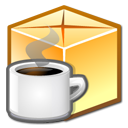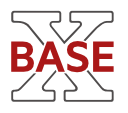The Comprehensive Perl Archive Network (CPAN) is a repository of over 250,000 software modules and accompanying documentation for 39,000 distributions, written in the Perl programming language by over 12,000 contributors. CPAN can denote either the archive network or the Perl program that acts as an interface to the network and as an automated software installer. Most software on CPAN is free and open source software.

A JAR file is a package file format typically used to aggregate many Java class files and associated metadata and resources into one file for distribution.
BioJava is an open-source software project dedicated to provide Java tools to process biological data. BioJava is a set of library functions written in the programming language Java for manipulating sequences, protein structures, file parsers, Common Object Request Broker Architecture (CORBA) interoperability, Distributed Annotation System (DAS), access to AceDB, dynamic programming, and simple statistical routines. BioJava supports a range of data, starting from DNA and protein sequences to the level of 3D protein structures. The BioJava libraries are useful for automating many daily and mundane bioinformatics tasks such as to parsing a Protein Data Bank (PDB) file, interacting with Jmol and many more. This application programming interface (API) provides various file parsers, data models and algorithms to facilitate working with the standard data formats and enables rapid application development and analysis.

LAMP is an acronym denoting one of the most common software stacks for the web's most popular applications. Its generic software stack model has largely interchangeable components.

Catalyst is an open-source web application framework written in Perl. It closely follows the model–view–controller (MVC) architecture and supports a number of experimental web patterns. It is written using Moose, a modern object system for Perl. Its design is heavily inspired by frameworks such as Ruby on Rails, Maypole, and Spring.
In Linux systems, initrd is a scheme for loading a temporary root file system into memory, to be used as part of the Linux startup process. initrd and initramfs refer to two different methods of achieving this. Both are commonly used to make preparations before the real root file system can be mounted.
EAR is a file format used by Jakarta EE for packaging one or more modules into a single archive so that the deployment of the various modules onto an application server happens simultaneously and coherently. It also contains XML files called deployment descriptors which describe how to deploy the modules.
The Java Media Framework (JMF) is a Java library that enables audio, video and other time-based media to be added to Java applications and applets. This optional package, which can capture, play, stream, and transcode multiple media formats, extends the Java Platform, Standard Edition and allows development of cross-platform multimedia applications.

Dojo Toolkit is an open-source modular JavaScript library designed to ease the rapid development of cross-platform, JavaScript/Ajax-based applications and web sites. It was started by Alex Russell, Dylan Schiemann, David Schontzler, and others in 2004 and is dual-licensed under the modified BSD license or the Academic Free License.
The Template Toolkit (TT) is a template engine used primarily for building web sites, but is also suitable for creating any type of digital document, such as a PDF or LaTeX file. Template Toolkit is based on a mini-language and does not allow direct Perl in its templates by default, unlike some competing products. This forces developers to separate business logic into Perl libraries, leaving only presentation logic in their templates. It is written in Perl, with some popular accessories in C. It is released under a free software licence.

Perl OpenGL (POGL) is a portable, compiled wrapper library that allows OpenGL to be used in the Perl programming language.
FastCGI is a binary protocol for interfacing interactive programs with a web server. It is a variation on the earlier Common Gateway Interface (CGI). FastCGI's main aim is to reduce the overhead related to interfacing between web server and CGI programs, allowing a server to handle more web page requests per unit of time.

BaseX is a native and light-weight XML database management system and XQuery processor, developed as a community project on GitHub. It is specialized in storing, querying, and visualizing large XML documents and collections. BaseX is platform-independent and distributed under the BSD-3-Clause license.
Dart is a programming language designed by Lars Bak and Kasper Lund and developed by Google. It can be used to develop web and mobile apps as well as server and desktop applications.
The following outline is provided as an overview of and topical guide to the Perl programming language:

Zim is a graphical text editor designed to maintain a collection of locally stored wiki-pages, a personal wiki. It works as a personal knowledge base and note-taking software application that operates on text files using markdown. Each wiki-page can contain things like text with simple formatting, links to other pages, attachments, and images. Additional plugins, such as an equation editor and spell-checker, are also available. The wiki-pages are stored in a folder structure in plain text files with wiki formatting. Zim can be used with the Getting Things Done method.
Enduro/X is an open-source middleware platform for distributed transaction processing. It is built on proven APIs such as X/Open group's XATMI and XA. The platform is designed for building real-time microservices based applications with a clusterization option. Enduro/X functions as an extended drop-in replacement for Oracle Tuxedo. The platform uses in-memory POSIX Kernel queues which insures high interprocess communication throughput.






